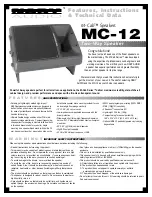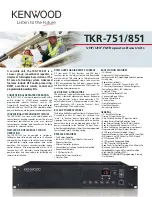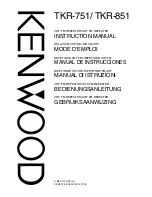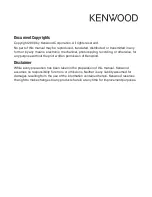
21
3.3 OPERATING PROCEDURES
Specific operating procedures for the RAY 210 are presented on this section.
General information regarding correct marine channel usage may be found in the
Appendix section. Refer to the Controls section 3.2.1 beginning on page!2 for a
thorough description of all functions.
3.3.1 Turning the power on ( Transmit/Receive)
Turn the ON/OFF/Volume control to switch the radio on. Rotate the knob
clockwise and set it at approximately the mid point of it's range.
3.3.2 Setting the volume
Rotate the Squelch control fully counterclockwise, and set the ON/OFF/Volume
control to the desired listening level.
3.3.3 Setting the Squelch
Rotate the Squelch control clockwise until the receiver becomes "quiet" and the
audible noise coming from the internal speaker ceases.
3.3.4 Selecting a Channel
Rotate the channel selector switch to the desired channel. See Table 3-2 (Page
23 and 24) for available U.S.A. and International channels and their frequencies.
To transmit and receive on channel 16/9, press the "quick" 16/9 key. If the
[16/9] is pressed again, the RAY 210 will return to the previous channel.
NOTE: Initial communication contacts are usually made on channel 16 as all
ships and shore stations monitor this channel. Then switch to a working
frequency for general communications.
3.3.5 Setting the Power Output
Press the [FUNC] and then the [1/25] key to select the power output. Power
setting is dependent on the distance the message is to be transmitted, and
transmitting conditions. In certain U.S. harbours and on certain channels, the
FCC requires the power to be limited to 1W. On these "required" channels, the
RAY 210 automatically selects 1 watt operation when the channel is selected
1W will appear beside the channel number.
3.3.6 To Transmit
To transmit, press the Push-To-Talk switch on the side of the RAY 210
microphone. Speak into the microphone using a clear, normal voice.
The RAY 210 is designed to meet the FCC Rules Part 80.203. This rule requires
transmitter time out circuitry which will automatically disable the transmitter
after 5 minutes of continuous transmit.
Summary of Contents for Ray 210
Page 2: ......
Page 3: ......
Page 4: ......
Page 6: ......
Page 8: ......
Page 10: ......
Page 12: ......
Page 19: ...7 Figure 2 2 Outline and Mounting Dimensions...
Page 30: ...18 Figure 3 1 Layout of Controls and Connectors...
Page 40: ...28 Fig 4 1 Block Diagram RF PCB...
Page 41: ...29 Fig 4 2 Block Diagram CPU PCB...
Page 55: ...43 6 2 RAY210 ASSEMBLY DRAWING...
Page 57: ...45 6 3 SCHEMATIC DIAGRAM Fig 6 1 Schematic diagram RF PCB...
Page 58: ...46 Fig 6 2 Schematic diagram CPU PCB l...
Page 59: ...47 Fig 6 2 Schematic diagram CPU PCB 2...
Page 60: ...48 Fig 6 3 RF PCB Layout Top View...
Page 61: ...49 Fig 6 4 RF PCB Layout Rear View...
Page 62: ...50 Fig 6 5 CPU PCB Layout Top view...
Page 63: ...51 Fig 6 5 CPU PCB Layout Rear View...
Page 64: ...52...
Page 75: ...63...
















































